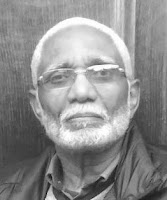Brian Volck seems to lead two lives ― at least two lives. In one manifestation he is a pediatrician who has served at Cincinnati Children’s Hospital, has provided pediatric care at the Indian Health Service hospital on the Navajo Reservation, and brought medical teams to Central America.
He is also a writer whose poetry collection Flesh Becomes Word (2013) was published by Dos Madras Press. Scott Cairns has said of this book, “These are poems of deep humility, of wide and deep learning, of abiding and strenuous faith—and pervasive joy.”
Volck’s passions for writing and healthcare come together in his published essays, in Reclaiming the Body: Christians and the Faithful Use of Medicine (2006, Brazos Press) which he co-wrote with Joel Shuman, and his memoir Attending Others: A Doctor’s Education in Bodies and Words (2016, Cascade Books).
He received his MFA from Seattle Pacific University, his MD from Washington University in St. Louis, and is currently completing a Master’s degree in theology from St. Mary’s Seminary in Baltimore. All of these connections now draw him to divide his time between Cincinnati, his home in Baltimore, and the landscape he loves in the American Southwest.
The following poem is from Flesh Becomes Word.
Having Crossed the Sea
(Exodus 15)
I have seen them, dead along the shore,
their bloated faces still ripe with hate.
And there was one I stopped at to kick—
kick him fiercely and hard in the face
the way they kicked my now dead husband
who wept at making bricks without straw—
but I found no joy in what I did.
Yesterday, we had cause to rejoice,
seeing Israel’s enemies crushed
between walls of leveling water
cast on them by our great God’s right hand.
But as we sang praises to heaven
in sight of their still floating corpses,
the cloud column swelled, grew darker, and
the rain fell: softly at first, and then
in great salt drops, so like tears, I wept
to learn one might mourn enemy dead
who were, after all, God’s children, too.
Posted with permission of the poet.
Entry written by D.S. Martin. He is the author of five poetry collections including Angelicus (2021, Cascade) ― a book of poems written from the point-of-view of angels. His books are available through Wipf & Stock.
Monday, April 25, 2022
Monday, April 18, 2022
Jill Peláez Baumgaertner*
Jill Peláez Baumgaertner is an influential Christian poet. As long-serving poetry editor for The Christian Century she has given voice to many worthy poets, encouraging them, and sharing their work with us. She is also past president of the Conference on Christianity and Literature. Her first poetry collection since What Cannot Be Fixed (2014, Poiema/Cascade) arrives this month ― From Shade To Shine from Paraclete Press.
She has edited two anthologies, Imago Dei: Poetry from Christianity and Literature (2012), and the forthcoming anthology Taking Root in the Heart which draws poems from The Christian Century.
In her academic career, Baumgaertner came to the English faculty of Wheaton College, in 1980, from Valparaiso University; she later served as Wheaton’s Dean of Humanities and Theological Studies (2001―2017), and has now retired.
Both of these poems are from her new book.
Easter, Before It’s Noticed
The garden in the deep night
after God’s rapt silence
has no breath. No echo even
in the vacant tomb which no one
yet has visited, no one seen.
and yet everywhere his breathing,
the turn begins, the blanket
of sunrise in mist stretches
to swaddle the earth,
gouged and waiting.
Easter
In the tomb
his cheek ashens,
the silence stiffens.
When will his cells enliven,
his blood begin its orbit,
his skin pinken?
When will he flex and rise
into the dawn of new time?
He quickens, infused with tempo,
his heartbeat
breaking through the grave’s secrets
crushing the silence,
trampling death.
And he rises.
he rises indeed,
light blazing.
Posted with permission of the poet.
*This is the third Kingdom Poets post about Jill Peláez Baumgaertner: first post, second post, fourth post.
Entry written by D.S. Martin. He is the author of five poetry collections including Angelicus (2021, Cascade) ― a book of poems written from the point-of-view of angels. His books are available through Wipf & Stock.
She has edited two anthologies, Imago Dei: Poetry from Christianity and Literature (2012), and the forthcoming anthology Taking Root in the Heart which draws poems from The Christian Century.
In her academic career, Baumgaertner came to the English faculty of Wheaton College, in 1980, from Valparaiso University; she later served as Wheaton’s Dean of Humanities and Theological Studies (2001―2017), and has now retired.
Both of these poems are from her new book.
Easter, Before It’s Noticed
The garden in the deep night
after God’s rapt silence
has no breath. No echo even
in the vacant tomb which no one
yet has visited, no one seen.
and yet everywhere his breathing,
the turn begins, the blanket
of sunrise in mist stretches
to swaddle the earth,
gouged and waiting.
Easter
In the tomb
his cheek ashens,
the silence stiffens.
When will his cells enliven,
his blood begin its orbit,
his skin pinken?
When will he flex and rise
into the dawn of new time?
He quickens, infused with tempo,
his heartbeat
breaking through the grave’s secrets
crushing the silence,
trampling death.
And he rises.
he rises indeed,
light blazing.
Posted with permission of the poet.
*This is the third Kingdom Poets post about Jill Peláez Baumgaertner: first post, second post, fourth post.
Entry written by D.S. Martin. He is the author of five poetry collections including Angelicus (2021, Cascade) ― a book of poems written from the point-of-view of angels. His books are available through Wipf & Stock.
Monday, April 11, 2022
John Robert Lee*
John Robert Lee is one of the significant younger St. Lucian contemporaries of the late Nobel laureate Derek Walcott. Lee’s most recent collection, Pierrot (2020, Peeple Tree) marks his seventieth year, and shares his reflections on his life’s journey and the departures into death of both friends and cultural heroes.
The Pierrot figure, according to his publisher’s website, is “the sad clown, holy fool of literary tradition, the suffering artist who connects to Christ in his most human incarnation as Man of Sorrows, and he is also the Pierrot Grenade of Caribbean carnival…Sometimes Pierrot is an archetypal figure, sometimes he may be thought to be Lee himself.”
In a recent interview Lee stated, “You know, I am actually a Baptist elder and pastor in my church, a practicing Christian, for over forty years.” In his younger days, he says, he walked with Rastafari, but that he left them for religious reasons.
The following is from The Passion and Resurrection Canticles.
Gethsemani
What commenced in the other garden begins to end here,
in the shadow of an olive mill by a black brook.
“Behold, We have become like one of them, to bear
their sorrows and their griefs.” Let the wheel break
this Fruit on every tooth and tread. Bruise
the Seed under the trampling heel of the Bull
of Bashan. Pour the sweating barrel
of this agony into the cupping palms of God.
Posted with permission of the poet.
*This is the second Kingdom Poets post about John Robert Lee: first post.
Another John Robert Lee poem was recently posted at Poems For Ephesians.
Entry written by D.S. Martin. He is the author of five poetry collections including Angelicus (2021, Cascade) ― a book of poems written from the point-of-view of angels. His books are available through Wipf & Stock.
The Pierrot figure, according to his publisher’s website, is “the sad clown, holy fool of literary tradition, the suffering artist who connects to Christ in his most human incarnation as Man of Sorrows, and he is also the Pierrot Grenade of Caribbean carnival…Sometimes Pierrot is an archetypal figure, sometimes he may be thought to be Lee himself.”
In a recent interview Lee stated, “You know, I am actually a Baptist elder and pastor in my church, a practicing Christian, for over forty years.” In his younger days, he says, he walked with Rastafari, but that he left them for religious reasons.
The following is from The Passion and Resurrection Canticles.
Gethsemani
What commenced in the other garden begins to end here,
in the shadow of an olive mill by a black brook.
“Behold, We have become like one of them, to bear
their sorrows and their griefs.” Let the wheel break
this Fruit on every tooth and tread. Bruise
the Seed under the trampling heel of the Bull
of Bashan. Pour the sweating barrel
of this agony into the cupping palms of God.
Posted with permission of the poet.
*This is the second Kingdom Poets post about John Robert Lee: first post.
Another John Robert Lee poem was recently posted at Poems For Ephesians.
Entry written by D.S. Martin. He is the author of five poetry collections including Angelicus (2021, Cascade) ― a book of poems written from the point-of-view of angels. His books are available through Wipf & Stock.
Monday, April 4, 2022
Ann Weems
Ann Weems (1934―2016) is a Presbyterian writer, who lived in St. Louis for more than fifty years. She is known for her devotional poetry, and liturgical texts which were used in worship services. She wrote seven books, several of which are books of poems including Kneeling in Jerusalem (1993) and Psalms of Lament (1999) ― both published by John Knox Press.
One of her greatest aches was when her son Todd was murdered on his 21st birthday. Her friend Walter Brueggemann asked her. “Will Rachel finally be comforted?” Ann responded, “No. Not until God wipes away every tear from our eyes.”
She was a Presbyterian elder, and “a noted writer, speaker, liturgist and worship leader.” Her mother had been a writer of historical novels and children’s books, and her father a Presbyterian minister.
The Way to Jerusalem is Cluttered
The way to Jerusalem
is cluttered
with bits and pieces of our lives
that fly up and cry out,
wounding us as we try
to keep upon this path
that leads to Life.
Why didn’t somebody tell us
that it would be so hard?
In the midst of the clutter,
the children laugh
and run after stars.
Those of us who are wise
will follow,
for the children will be the first
to kneel in Jerusalem.
Entry written by D.S. Martin. He is the author of five poetry collections including Angelicus (2021, Cascade) ― a book of poems written from the point-of-view of angels. His books are available through Wipf & Stock.
One of her greatest aches was when her son Todd was murdered on his 21st birthday. Her friend Walter Brueggemann asked her. “Will Rachel finally be comforted?” Ann responded, “No. Not until God wipes away every tear from our eyes.”
She was a Presbyterian elder, and “a noted writer, speaker, liturgist and worship leader.” Her mother had been a writer of historical novels and children’s books, and her father a Presbyterian minister.
The Way to Jerusalem is Cluttered
The way to Jerusalem
is cluttered
with bits and pieces of our lives
that fly up and cry out,
wounding us as we try
to keep upon this path
that leads to Life.
Why didn’t somebody tell us
that it would be so hard?
In the midst of the clutter,
the children laugh
and run after stars.
Those of us who are wise
will follow,
for the children will be the first
to kneel in Jerusalem.
Entry written by D.S. Martin. He is the author of five poetry collections including Angelicus (2021, Cascade) ― a book of poems written from the point-of-view of angels. His books are available through Wipf & Stock.
Subscribe to:
Comments (Atom)






















